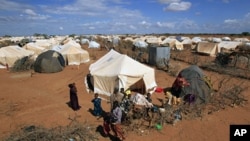The United Nations Refugee Agency, UNHCR, is employing new work strategies to help keep Kenya’s Dadaab refugee camps running with uninterrupted humanitarian assistance.
More than 460,000 refugees now call the world’s largest refugee settlement home.
The agency says the new measures involve a stronger and deeper involvement of the refugee communities in the day to day operations.
They include training, retraining for some, and mentoring of refugee workers and volunteers, from healthcare to the collection of garbage.
Vivian Tan is a spokesperson for the UN Refugee Agency. She said given the security climate in the region and with restricted movement by international NGO’s, and the U-N, refugees are being trained in various activities at Dadaab.
“We’re training them in areas such as building new latrines, collecting solid waste, and, identifying vulnerable families that need assistance,” she explained.
Tan said the refugees have responded enthusiastically to their responsibilities at the camps because they understand the effect insecurity has had, and see it is the only way aid agencies can continue to provide assistance.
“We’ve had different categories of refugees coming forward in the camps such as youths who are enthusiastic about helping us, not just with manual labor, but to be trained in some type of supervisory role, “ said Tan.
Also, refugees previously trained as teachers are volunteering to help keep the classes going when NGO staff can’t run the schools at the camp. To hear the entire interview, please click on audio.




